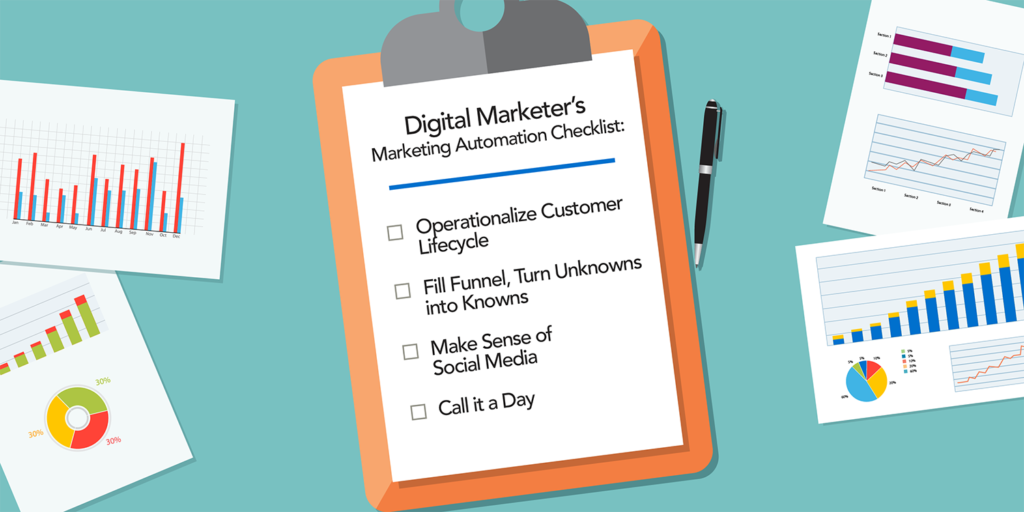
I was a digital marketing professional when I first fell in love with marketing automation (MA). As an early adopter, I shared stories with my peers of all the great new capabilities we had because of this emerging platform.
Since then, thousands of MarTech applications and platforms have entered the market, destined to supplant MA as the 800-pound gorilla of the MarTech stack.
Marketing automation has largely been relegated to the techies in Marketing Operations or Marketing Shared services. Engagement data from visitors to DemandGen’s site, as well as our content, testifies to a broad interest from digital marketers.
Three Words: Customer Journey Realized
For some time now, marketers have been talking about the “customer journey” or the “buyer’s journey.” It might be as simple as this:

Thanks to the rapid growth in point solutions and hub-based platforms, the idea of “customer journey analytics” has become a reality. This means digital and demand marketers can use data to tell a narrative about how buyers come in and out of their journeys.
Most of my clients have incorporated persona development into content development. Building out a Demand Factory™, complete with lead management and digital marketing best practices, makes buyer personas come to life. Once a marketing organization can visualize this data, the question “How many downloads for that whitepaper?” changes to “How and when are these personas engaging with us?” and “How can we adjust strategy, content, messaging and offers based on what we now know?”
Digital Marketing Investment – Turning Unknowns into Revenue
I first got into MarTech because I was a digital marketer spending a good portion of my employer’s marketing investment on digital. These “leads” were going into our customer datamart and being “remarketed to”—meaning if we touched them again with any other campaign, they would be passed to sales.
Without a doubt, this approach is not conducive to success, even if vanity metrics tell you otherwise. This is one of the many challenges MA solves. Combining digital body language with scoring and nurturing provides deliberate paths for unknown and potential prospects to take. And the insights into lead and contact records this combination delivers to frontline sales functions is immeasurable. The Sales Development reps from one of my current clients use Marketo Sales Insights as one of their primary tools.
What I’ve described might seem common sense to those who’ve been using MA and MarTech for a long time. However, according to this report from chiefmartec, the number of MA platforms in use grew 36% from 2016 to 2017. Clearly, the marketing automation story has yet to be finished.
Making Sense of Social Media
Most marketers I know have a love/hate relationship with social media. I know I do. I also know many social media marketers who love MA for its attribution capabilities, such as attaching social efforts to revenue and pipeline generation.
In fact, many social media professionals say the #1 question management asks them is “How does social impact demand generation and revenue?” Well, MA platforms can connect via plugins to channels such as Facebook, LinkedIn, Twitter and Instagram, enabling marketers to sync all customer data from paid social programs with other digital campaign efforts.
MA can also help make sense of social media with segmentation and multichannel nurture. The benefits of using social media and MA together keep expanding.
The Bellwether of MarTech
The function of digital marketing continues to evolve in the enterprise, and many CMOs and thought leaders think a function of digital marketing should just be called “Marketing.” The reality is that many organizations are still finding their way with digital.
Digital marketing involves purchasing MarTech outside of MA, while MA is the intersection for seeing the true value of those MarTech investments. Marketing automation has become the decision management platform for the MarTech ecosystem – the “bellwether of MarTech” as Brinker notes. It allows your Demand Factory to operate all day, every day.
For more on MarTech and building out your stack, download https://www.demandgen.com/best-practices-for-evaluating-and-building-out-your-martech-stack/
 Will Waugh is a consultant for DemandGen focused on helping clients with demand generation, lead management and leveraging marketing technology. He genuinely believes that data can change the world.
Will Waugh is a consultant for DemandGen focused on helping clients with demand generation, lead management and leveraging marketing technology. He genuinely believes that data can change the world.
The post Why Digital Marketers Love Marketing Automation appeared first on DemandGen.
About the Author
More Content by DemandGen























